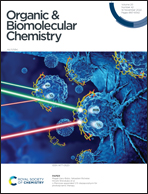Noncooperative guest binding by metal-free [2 + 2] Schiff-base macrocycles†
Abstract
Salphen-based [n + n] macrocycles have been widely explored for their unique chemical and topological properties following metal ion coordination. Despite having vastly different reactivity than their coordinated counterparts, fewer studies have focused on metal-free salphen macrocycles. We investigated the binding of [2 + 2] Schiff-base macrocycle host 3, which contains a central 18-crown-6-like cavity and two N2O2 moieties. This macrocycle strongly binds to spherical cationic guests (K11 ≈ 103–104 M−1, DCM/MeCN). The most robust binding was shown for K+ and Na+, followed by Li+ and Rb+. More sterically demanding cationic guests like dibenzylammonium (DBA+) showed almost no binding. The binding pocket in 3 is slightly smaller than 18-crown-6, resulting in binding outside the cavity, which provides a scaffold appropriate for 2 : 1 complexes, where two host molecules sandwich the guest. All host–guest complexes follow a 2 : 1 noncooperative binding model, where each successive binding event is less likely than the previous, unlike coordinated versions of 3, where most binding is 1 : 1.
![Graphical abstract: Noncooperative guest binding by metal-free [2 + 2] Schiff-base macrocycles](/en/Image/Get?imageInfo.ImageType=GA&imageInfo.ImageIdentifier.ManuscriptID=D2OB01511K&imageInfo.ImageIdentifier.Year=2022)


 Please wait while we load your content...
Please wait while we load your content...